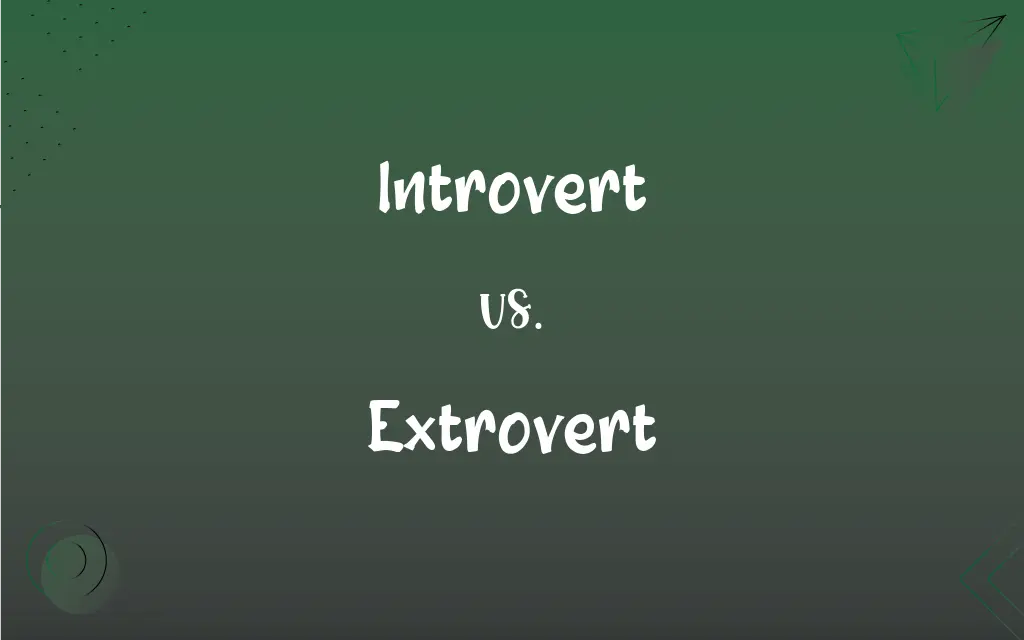Introvert vs. Extrovert: What's the Difference?
Edited by Janet White || By Harlon Moss || Updated on October 19, 2023
Introverts tend to recharge by spending time alone, while extroverts gain energy from interacting with others.

Key Differences
Introverts often feel energized and refreshed by solitary or low-stimulation environments, while extroverts thrive in social settings and external engagements.
Introverts typically prefer depth in their conversations and relationships, whereas extroverts might lean towards breadth, embracing varied interactions and a larger circle of acquaintances.
Introverts may find prolonged social interaction draining, choosing quality over quantity in their engagements, while extroverts seek out and enjoy frequent social stimulation, often feeling rejuvenated by it.
Introverts usually process their thoughts internally and might take longer to share, while extroverts are generally more vocal and spontaneous in expressing their ideas and feelings.
While introverts are often introspective and enjoy deep self-reflection, extroverts are outward-facing, actively seeking external stimuli and feedback.
ADVERTISEMENT
Comparison Chart
Energy Source
Recharge in solitude.
Energized by social interaction.
Social Preference
Small, meaningful gatherings.
Large, dynamic groups.
Thought Processing
Internal reflection before speaking.
Often think out loud.
Engagement Focus
Depth in interactions.
Breadth in interactions.
Response to Stimuli
Can get overwhelmed by too much stimuli
Seek out and thrive on stimuli.
ADVERTISEMENT
Introvert and Extrovert Definitions
Introvert
An introvert is someone who feels more comfortable in solitary or low-stimulus environments.
After the party, the introvert preferred to unwind alone with a book.
Extrovert
An extrovert is someone who thrives on social interaction and external stimulation.
The extrovert was the life of the party, mingling with everyone.
Introvert
An introvert typically has a smaller circle of close friends.
The introvert cherished her tight-knit group of friends.
Extrovert
An extrovert usually enjoys being in the spotlight and sharing their thoughts openly.
The extrovert eagerly shared his story with the group.
Introvert
An introvert often prefers deep, meaningful conversations over small talk.
The introvert engaged in a profound discussion about life's purpose.
Extrovert
An extrovert often seeks out new experiences and adventures.
Being an extrovert, she was always eager to try new activities.
Introvert
An introvert might need time alone to process events or interactions.
After the meeting, the introvert took a moment to gather his thoughts.
Extrovert
An extrovert tends to have a wide circle of acquaintances and friends.
The extrovert had friends in every city she visited.
Introvert
An introvert may find excessive social interactions draining.
After a full day of socializing, the introvert felt the need to recharge.
Extrovert
An extrovert often feels rejuvenated by engaging with others.
After a long day, the extrovert was eager to catch up with friends.
Introvert
To turn or direct inward.
Extrovert
An extroverted person.
Introvert
(Psychology) To concentrate (one's interests) upon oneself.
Extrovert
A person who is extroverted; a person who is marked by an interest in others or concerned primarily with external reality. Contrasted with introvert.
Extrovert
(psychology) a person concerned more with practical realities than with inner thoughts and feelings
Extrovert
Characterized by extroversion
FAQs
What is an introvert?
An introvert is someone who often feels more comfortable and recharged in solitary or low-stimulus environments.
What is an extrovert?
An extrovert is someone who is energized by social interactions and external environments.
Do introverts dislike socializing?
Not necessarily. Introverts can enjoy socializing but might prefer smaller, meaningful interactions over large gatherings.
Can someone be both an introvert and extrovert?
Yes, this is termed "ambivert," where a person exhibits traits of both introversion and extroversion.
Do extroverts make better leaders?
Leadership isn't determined by extroversion or introversion. Both can be effective leaders in different ways.
Are introversion and shyness the same?
No, introversion is about energy sources, while shyness relates to social anxiety. An introvert may not be shy.
How can I support my introverted friend or partner?
Offer them space when needed, understand their social boundaries, and engage in deep, meaningful conversations.
Can extroverts enjoy solitude?
Yes, extroverts can appreciate solitude but typically feel more energized in social settings.
Are introverts less confident than extroverts?
No, introversion and confidence are not directly related. An introvert can be very confident.
How do extroverts handle stress?
Extroverts might seek out social interactions or external activities as a way to cope.
Are introversion and extroversion genetic?
While there's evidence suggesting a genetic component, environmental factors and personal experiences also play a significant role.
Is it better to be an introvert or extrovert?
Neither is inherently "better." Both have unique strengths and challenges.
Are there jobs better suited for introverts or extroverts?
While certain roles might naturally align with traits of introversion or extroversion, individual passion and skills are most crucial.
Can people change from being introverted to extroverted and vice versa?
While core tendencies may remain, life experiences can influence and shift someone's position on the introversion-extroversion spectrum.
How can extroverts best interact with introverts?
Understanding and respecting their need for downtime, avoiding pushing them into high-stimulus situations, and valuing depth in conversation can help.
How can I support my extroverted friend or partner?
Engage in social activities with them, offer feedback and external stimulation, and appreciate their need for varied interactions.
Do introverts need more personal space than extroverts?
Introverts might value personal space more as they often recharge in solitude, but individual needs can vary.
How do introverts handle stress?
Introverts might seek solitude or engage in reflective activities to cope with stress.
Can cultures be more introverted or extroverted?
Yes, cultural norms can promote either introverted or extroverted behaviors, but individual variations will always exist.
How can I tell if I'm more of an introvert or extrovert?
Self-reflection and, potentially, psychological assessments can provide insights into where you fall on the spectrum.
About Author
Written by
Harlon MossHarlon is a seasoned quality moderator and accomplished content writer for Difference Wiki. An alumnus of the prestigious University of California, he earned his degree in Computer Science. Leveraging his academic background, Harlon brings a meticulous and informed perspective to his work, ensuring content accuracy and excellence.
Edited by
Janet WhiteJanet White has been an esteemed writer and blogger for Difference Wiki. Holding a Master's degree in Science and Medical Journalism from the prestigious Boston University, she has consistently demonstrated her expertise and passion for her field. When she's not immersed in her work, Janet relishes her time exercising, delving into a good book, and cherishing moments with friends and family.































































